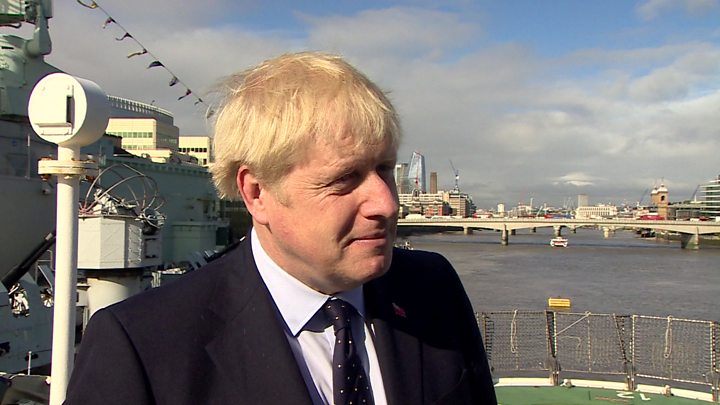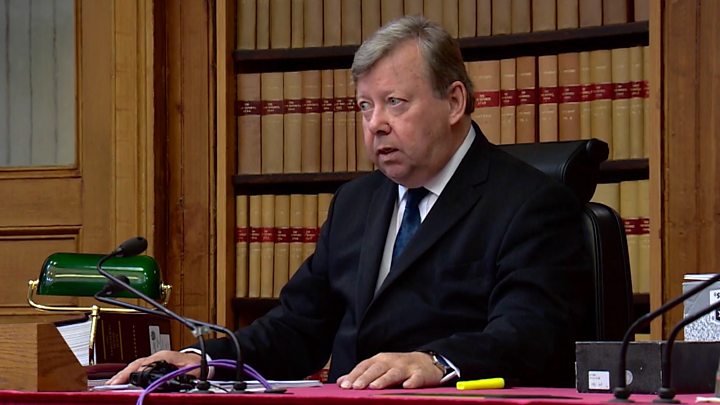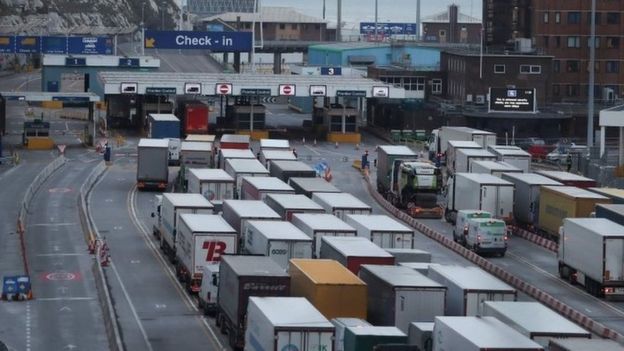
Boris Johnson has denied lying to the Queen over the advice he gave her over the five-week suspension of Parliament.
The prime minister was speaking after Scotland's highest civil court ruled on Wednesday the shutdown was unlawful.
Asked whether he had lied to the monarch about his reasons for the suspension, he replied: "Absolutely not."
He added: "The High Court in England plainly agrees with us, but the Supreme Court will have to decide."
The power to suspend - or prorogue - Parliament lies with the Queen, who conventionally acts on the advice of the prime minister.
The current five-week suspension began in the early hours of Tuesday, and MPs are not scheduled to return until 14 October.
Labour has said it is "more important than ever" that Parliament is recalled after the government published its no-deal Brexit assessment.
Shadow chancellor John McDonnell said he was "angry" that MPs would not be able to debate the Yellowhammer document during the suspension.
- Recall urged after no-deal Brexit papers released
- Judges rule Parliament suspension is unlawful
- What is the UK doing to get ready for a no-deal Brexit?
- EU 'willing to revisit NI-only backstop'
The planning file - published on Wednesday after MPs forced its release - warned of food and fuel shortages in a no-deal scenario.
But Mr Johnson insisted the UK "will be ready" to leave the EU by the current 31 October deadline without an agreement "if we have to".
"What you're looking at here is just the sensible preparations - the worst-case scenario - that you'd expect any government to do," he said.
"In reality we will certainly be ready for a no-deal Brexit if we have to do it and I stress again that's not where we intend to end up."

In a unanimous ruling, the Court of Session in Edinburgh said Mr Johnson's decision to order the suspension was motivated by the "improper purpose of stymieing Parliament".
It came after a legal challenge launched by more than 70 largely pro-Remain MPs and peers, headed by SNP MP Joanna Cherry.
But a ruling last week from the High Court in London had dismissed a similar challenge brought by businesswoman and campaigner Gina Miller.
In their rejection of her claim, the judges argued the suspension of Parliament was a "purely political" move and was therefore "not a matter for the courts".
Mr Johnson has suggested it was "nonsense" to suggest the move was an attempt to undermine democracy, insisting it is normal practice for a new PM.
Suspension criticised
Prorogation normally takes place every year, but the length and timing of the current suspension - in the run-up to Brexit - has attracted controversy.
Opposition parties have accused the prime minister of ordering it to prevent criticism of its Brexit strategy and contingency plans for a no-deal exit.
They backed a move to order the release of communications between No 10 aides about the decision to order the suspension.
But the government has blocked their release, saying the request to see e-mails, texts and WhatsApp messages from Dominic Cummings, Boris Johnson's chief aide, and eight other advisers in Downing Street was "unreasonable and disproportionate".
 PA MEDIA
PA MEDIA
The Yellowhammer file, which is redacted in parts and almost identical to a version leaked to the Sunday Times last month, says a no-deal Brexit could lead to:
- a "decrease" in certain types of fresh food and "shorter supply" of key ingredients
- price rises for food and fuel, which would "disproportionately" affect those with low incomes
- "disruption lasting up to six months" potentially affecting medicines and medical supplies
- protests and counter-protests across the UK
- lorries waiting for more than two days to cross the English Channel
The document also says some businesses could cease trading, and the black market could grow in response to disruption along the UK's border with Ireland.
"This will be particularly severe in border communities, where both criminal and dissident groups already operate with greater threat and impunity," it added.
It also raised the prospect of "protests and direct action" in Northern Ireland as a result of disruption to key sectors.
Michael Gove, the cabinet minister with responsibility for no-deal planning, told the BBC the government had taken "considerable steps" to ensure the safest possible departure after a no-deal Brexit in the six weeks since 2 August, the date which appears on the document.
On Wednesday, he said "revised assumptions" will be published "in due course alongside a document outlining the mitigations the government has put in place and intends to put in place"

No comments:
Post a Comment